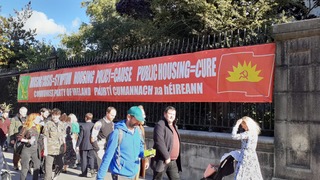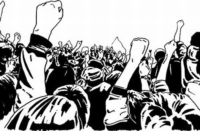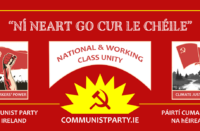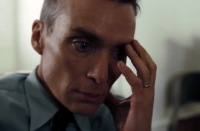Forty-eight TDs and twenty-nine senators are landlords, with others owning shares in companies and some owning both shares and rented property.
The majority of landlords are in Fine Gael, followed by Fianna Fáil. Other parties with landlords or shares include Sinn Féin, the Green Party, and the Labour Party, while some independents also hold property and shares. Michael Healy-Rae is the biggest landlord at present in the Dáil, with eighteen properties and more than 100 acres of land.
These TDs are elected representatives of working-class people around the country; but do they really represent the interests of those who elected them?
Working-class people struggle to find affordable accommodation, while rents increase and inflation is causing rising prices. It’s clear that this cost-of-living crisis is really just the cost of living under capitalism: it isn’t a crisis for those who are profiteering, such as those with shares in companies, or properties for renting.
“Representative democracy” is defined as made up of elected persons who represent a group of people; however, that is not what we have in Ireland. Landlords and shareholders cannot and will not represent the interests of the working class, as that directly conflicts with their own interests.
For example, working 40 hours a week on the minimum wage in Dublin this will be under €2,000, while the average rent in Dublin is nearly €2,100. On top of this, the average electricity bill in Ireland since 1 October is €181 a month. Why won’t the Government, those who represent the people of Ireland, do something to alleviate this? Because it would go directly against their interests as landlords.
If we consider raising the minimum wage to a living wage, the companies they have shares in will lose profits; and if we were to introduce a rent cap, or public housing for all, they would lose out on their rental income.
Within a capitalist society there is a class war between the capitalist class and the working class. Our two interests contradict and cannot be resolved, unless the capitalist system of profiteering is done away with. While we fight for an increase in real wages—i.e. the actual buying power of wages—the capitalist class fight against it, as that causes a loss in profits. While we fight for a housing system that can accommodate all, the landlords in the Government fight against it. We have seen already their readiness to privatise our basic needs, with the attempted privatisation of water and the implementation of water charges. The working class banded together and, through mass action, fought against this privatisation.
They sold off Dublin bus routes to the Go-Ahead group, a British public transport company. Go-Ahead pay their drivers €4,000 less per year than Dublin Bus. This pay cut was caused by privatisation. Bord Gáis Éireann was sold off and privatised, taking the possibility of a regulated and subsidised energy industry away from the people.
Those in power want to privatise everything they can, especially if it can translate to money in their pockets. Now we see the Government selling the shares they bought from the banks to bail them out as a promise of privatisation. They continue to sell public land that could be used for public housing to vulture funds and private developers, exacerbating the housing crisis and pushing more people into homelessness and poverty.
The capitalists need the workers, but the workers do not need the capitalists.
To fix such issues as homelessness and poverty wages we need a worker-run government to put the interests of the people first. Electing landlords and shareholders to positions of power will change nothing. They do not represent our interests. Only through mass action of the working class as an organised class, through unions and a party made up of the revolutionary workers, can change truly be brought about. True representation in positions of power will come when the workers are in those positions.






